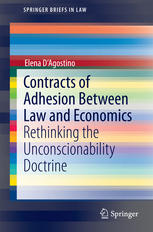

Most ebook files are in PDF format, so you can easily read them using various software such as Foxit Reader or directly on the Google Chrome browser.
Some ebook files are released by publishers in other formats such as .awz, .mobi, .epub, .fb2, etc. You may need to install specific software to read these formats on mobile/PC, such as Calibre.
Please read the tutorial at this link: https://ebookbell.com/faq
We offer FREE conversion to the popular formats you request; however, this may take some time. Therefore, right after payment, please email us, and we will try to provide the service as quickly as possible.
For some exceptional file formats or broken links (if any), please refrain from opening any disputes. Instead, email us first, and we will try to assist within a maximum of 6 hours.
EbookBell Team

4.7
76 reviewsThis book examines the most controversial issues concerning the use of pre-drafted clauses in fine print, which are usually included in consumer contracts and presented to consumers on a take-it-or-leave-it basis.
By applying a multi-disciplinary approach that combines consumer’s psychology and seller’s drafting power in the logic of efficiency and good faith, the book provides a fresh and unconventional analysis of the existing literature, both theoretical and empirical. Moving from the unconscionability doctrine, it criticizes (and in some cases refutes) its main conclusions based on criteria which are usually invoked to sustain the need for public intervention to protect consumers, and specifically related to Law (contract complexity), Psychology (consumer lack of sophistication criterion) and Economics (market structure criterion).
It also analyzes the effects of different regulations, such as banning vexatious clauses or mandating disclosure clauses, showing that none of them protect consumers, but in fact prove to be harmful when consumers are more vulnerable, that is whenever sellers can exploit some degree of market power.
In closing, the book combines these disparate aspects, arguing that the solution (if any) to the problem of consumer exploitation and market inefficiency associated with the use of contracts of adhesion in these contexts cannot be found in removing or prohibiting hidden clauses, but instead has to take into account the effects of these clauses on the contract as a whole.